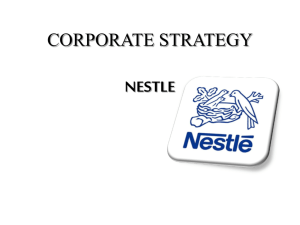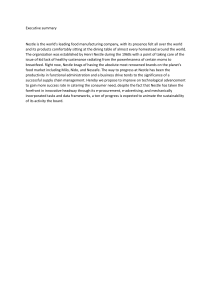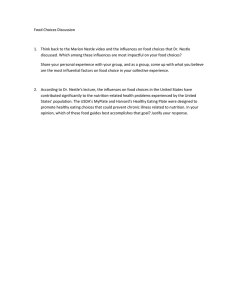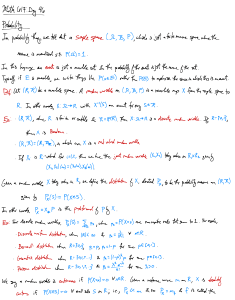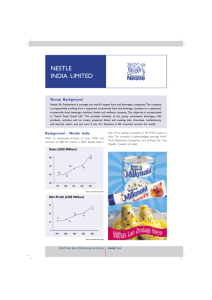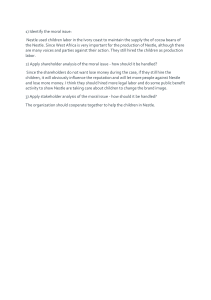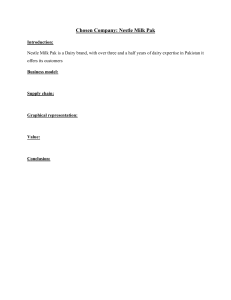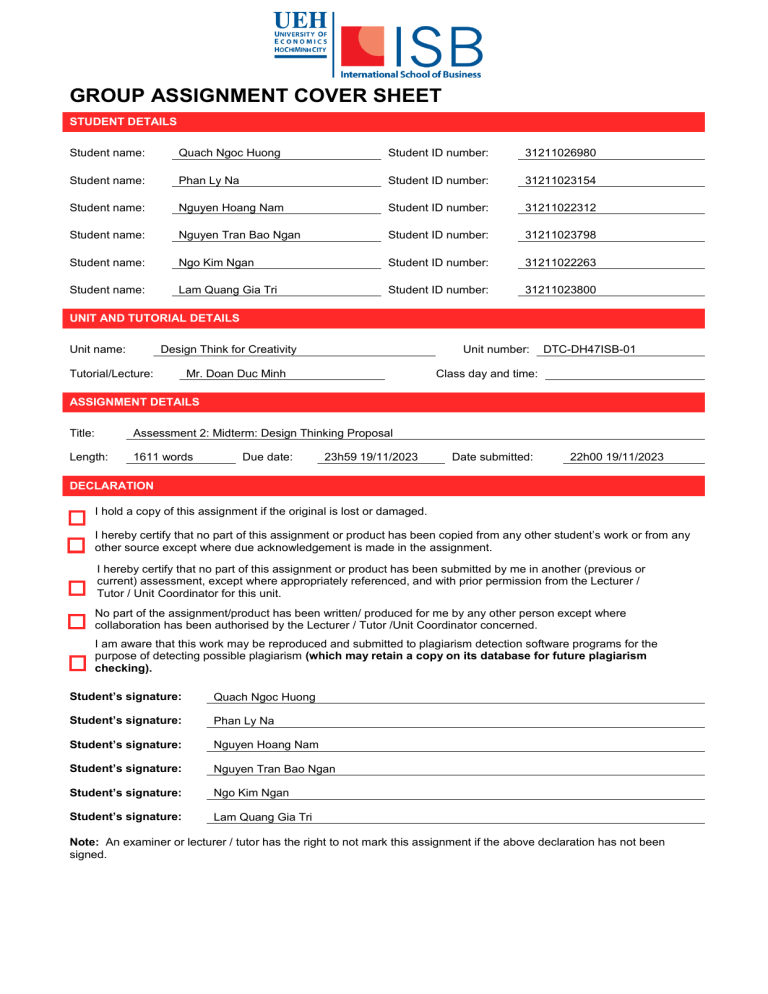
GROUP ASSIGNMENT COVER SHEET STUDENT DETAILS Student name: Quach Ngoc Huong Student ID number: 31211026980 Student name: Phan Ly Na Student ID number: 31211023154 Student name: Nguyen Hoang Nam Student ID number: 31211022312 Student name: Nguyen Tran Bao Ngan Student ID number: 31211023798 Student name: Ngo Kim Ngan Student ID number: 31211022263 Student name: Lam Quang Gia Tri Student ID number: 31211023800 UNIT AND TUTORIAL DETAILS Unit name: Design Think for Creativity Tutorial/Lecture: Unit number: Mr. Doan Duc Minh DTC-DH47ISB-01 Class day and time: ASSIGNMENT DETAILS Title: Assessment 2: Midterm: Design Thinking Proposal Length: 1611 words Due date: 23h59 19/11/2023 Date submitted: 22h00 19/11/2023 DECLARATION I hold a copy of this assignment if the original is lost or damaged. I hereby certify that no part of this assignment or product has been copied from any other student’s work or from any other source except where due acknowledgement is made in the assignment. I hereby certify that no part of this assignment or product has been submitted by me in another (previous or current) assessment, except where appropriately referenced, and with prior permission from the Lecturer / Tutor / Unit Coordinator for this unit. No part of the assignment/product has been written/ produced for me by any other person except where collaboration has been authorised by the Lecturer / Tutor /Unit Coordinator concerned. I am aware that this work may be reproduced and submitted to plagiarism detection software programs for the purpose of detecting possible plagiarism (which may retain a copy on its database for future plagiarism checking). Student’s signature: Quach Ngoc Huong Student’s signature: Phan Ly Na Student’s signature: Nguyen Hoang Nam Student’s signature: Nguyen Tran Bao Ngan Student’s signature: Ngo Kim Ngan Student’s signature: Lam Quang Gia Tri Note: An examiner or lecturer / tutor has the right to not mark this assignment if the above declaration has not been signed. TABLE OF CONTENTS I. Company Introduction 1.1 Company Background 1.2 Vision 1.3 Mission 1.4 Core values 1.5 Reasons to choose: II. Design Thinking Approaches 1. Inspiration 2. Ideation 3. Implementation III. Design Thinking Principles IV. References 2 2 2 2 2 2 3 3 3 4 5 6 1 I. Company Introduction 1.1 Company Background Headquartered in Switzerland, Nestlé S.A. is a multinational conglomerate firm founded in 1866. It specializes in the food and drink industry, offering a wide range of products and services Nestle has over 2000 brands, with twenty-nine brands achieving annual sales of over USD 1 billion. Some popular brands include Nespresso, Nescafé, Kit Kat, and Maggie. With over 339,000 employees operating in 189 countries, and 447 factories, Nestlé has been the largest food company in the world that is publicly held since 2014. It was number sixty-four on the Fortune Global 500 in 2017 and number thirty-three on the Forbes Global 2000 list of the biggest publicly traded firms in 2016. 1.2 Vision To be a leading, competitive, Nutrition, Health and Wellness Company delivering improved shareholder value by being a preferred corporate citizen, preferred employer, preferred supplier selling preferred products. 1.3 Mission Our mission of "Good Food, Good Life" is to provide consumers with the best tasting, most nutritious choices in a wide range of food and beverage categories and eating occasions, from morning to night. 1.4 Core values At Nestlé, respect has a special and powerful meaning. It has a huge impact on the way Nestlé works and runs its business. Its core values are rooted in respect: ● Respect for ourselves – Respect starts with self-respect. Being true to ourselves, while acting with integrity, fairness and authenticity. ● Respect for others – Respecting others is about meeting our promises. It’s about quality in our products, our brands and everything we do. ● Respect for diversity – Respect for other ways of thinking, other cultures and all aspects of society requires inclusiveness and openness in all our interactions. ● Respect for the future – Respect for the future of our planet and future generations compels us to act with responsibility and courage, even if it’s difficult. 1.5 Reasons to choose: There are 3 justifiable reasons why Nestle is an optimal choice for innovation and design thinking. 1. Sustainable competitive advantage (SCA) Since its founding in 1866, Nestlé has dedicated itself to improving people's lives by using its knowledge and resources for research and development. After going through more than a century, its purpose to improve people's lives remains unchanged. In order to maintain its leadership and competitive advantage in the food and beverage business, the firm leverages its deep understanding of customers, broad worldwide network, lasting brand legacy, and agility. 2. Human-centric production and consideration 2 As people become more health-conscious, Nestle recognizes the challenge of providing adequate nutrition to a growing global population. To address this, Nestle aims to lead the way in offering nutritious meals while prioritizing environmental protection and restoration. Their products are designed to serve and enhance human lives, with a strong focus on customer satisfaction. 3. Research & Development and beyond Nestle not only provides nutritious products but also contributes to the scientific community through its nutrient research and development (R&D) efforts. Since Nestle makes continuous efforts to develop the nutritional value of its products and promote responsible consumption as a key component of a balanced diet, it is actively involved in developing innovative technologies. The company regularly organizes and participates in scientific conferences, where it presents its nutrition research and engages in discussions with the scientific and professional communities. These proactive measures reflect Nestle's commitment to advancing nutrition science and promoting healthier consumption habits. II. Design Thinking Approaches 1. Inspiration In the first stage of the 3I Model, Nestle needs to identify some customers’ problems that could be valuable opportunities for them to invent the Orgain. Some of the main issues are: - People can easily lose weight and have their health deteriorated after physical illness and stress - People want nutritional products for their wellness journey - Most people think protein drinks is expensive do not have delicious taste In fact, what might be the most painful point for the customers is the gradual debilitation of physical health. In particular, an article written by Sandoiu, A. in 2016 strongly stated about the correlation between poor work-life balance and health debilitation. Lack of sleep, unhealthy diet and infrequent exercise are the determinants of multiple physical illnesses, consequently impacting on the human’s quality of life. Moreover, consistent mental stress directly causes weight loss and health deterioration. This unwilling condition affects negatively and widely on all parts of the body including musculoskeletal, respiratory, cardiovascular and reproductive system (APA, 2023). This, coupled with the unawareness of a wholesome diet, unequivocally influences wellbeing. By deeply understanding the customers’ insights of finding a product that can help them get healthier, Nestle possesses several opportunities, or competitive advantages, to launch the Orgain products. - Nestle's renowned status as a top provider of nutritious food globally enhances the favorable reception of their new product among loyal customers. - Additionally, Nestle's customer-focused mission drives the creation of a delicious and nutritious product, distributed widely to meet global demand and enhance overall well-being. - Lastly, Nestle's innovation in incorporating sustainable plant-based ingredients into Orgain products sets them apart significantly from competitors. 2. Ideation People are highly health-conscious, however, they have limitations in knowledge, time and budget to choose a suitable product. Therefore, Orgain solves all their issues in 1 product. Therefore, some ideal features of the new product are suggested for Orgain: 3 - A product suitable for both non-vegan and vegan with affordable price. - Clean Nutrition: - Delicious Taste - High Quality Ingredient In the process of producing the product, the company has tested and got feedback for the prototype. For the product quality test, all of Orgain manufacturing facilities are registered with the FDA and based in the United States. In terms of manufacturer checking, all facilities also have a third party Food Safety and GMP certification from either NSF, or other Global Food Safety Initiative (GFSI) benchmarked certifications such as SQF, BRC, or FSSC. The company also conducts the taste test in which they give the kids samples to try all of their innovations and receive their feedback (kids bluntness and honesty will be extremely important for Orgain to improve the taste). 3. Implementation ● Create the action plan At the beginning, Nestle built an action plan inspired by a culture of innovation: rapid prototyping, getting things out fast, and experimentation. ● Feedback and iterate They aim to be calm and fearless as well as persistent, solid and resilient. They will keep trying till they find it out and do not mind failing and do not have any regrets. Additionally, they desire to gain the best feedback after they give the kids trial products. ● Launch in the market 4 Finally, Orgain introduced in 2009 and became the first ready-to-drink organic smoothie in history. Since then, the company has grown, and they now have over a hundred SKUs and have established themselves as something of a clean nutrition leader. III. Design Thinking Principles End-user needs, as in “focus on understanding and meeting end user needs in a human-centered and responsible manner which does not just focus on financial returns for the organization”, is displayed by Nestlé in understanding the inherent need for an all-inclusive milk alternative that is suitable for every occasion. With plant-based diets growing in popularity, more people are turning to alternatives to milk for their daily cereal, latte, desserts, baking or cooking. Most plant-based milk alternatives have specific characteristics that may not be suitable for different ocassions. This meant you might need two or three plant-based options for different uses. Thus, Nestlé is launching Wunda, a new pea-based beverage that is 'epic in everything' that satisfies all your needs for use. Dynamism indicates the act of “pro-active in identifying and responding to the various macro environmental forces that can impact on the organization’s ability and capacity conduct business in a changing disruptive environment”. This is demonstrated by Nestle’s action plan to reduce emissions in order to deal with climate change - one of society’s greatest challenges. To reach their goals, Nestle aims to achieve 50% emissions reduction by 2030 and reach Net Zero emissions by 2050 by specific actions: Sourcing ingredients sustainably – Working with partners to source ways that protect ecosystems, and reduce emissions; Evolving packaging – Investments in packaging innovations to help keep waste out of landfill; Driving toward cleaner logistics – Optimizing routes, filling vehicles more efficiently, switching to low-emission fuels and renewable electricity; etc. Integrated foresight is expressed as “always consider future trends and demands in developing strategies that are human-centered for end-user needs", Nestle is actively addressing world hunger by developing human-centered strategies that consider future trends and demands. As obtaining affordable, nutritious food becomes increasingly difficult, Nestle aims to provide nourishing meals while protecting the environment. Recently, the company introduced plant-based foods, including plant-based substitutes for eggs and shrimp. Specifically mentioned is the plant-based alternative to egg innovation, which provides a nutritious and tasty alternative to conventional eggs through soy protein and omega-3 fatty acids and allows for versatility in cooking (Neslé, 2021). Overall, this innovative product demonstrates Nestlé's commitment to providing sustainable solutions that benefit people while also encouraging people worldwide to adopt plant-based diets and support animal welfare. Creative learning, as in “trust and empower the teams to be creative in a human-centered manner when developing and implementing strategies”, is demonstrated at Nestlé primarily through their Design Thinking Coach Certification Programme (Employee Experience Lab, 2018). Together with the Employee Experience Lab and the Design at Business teams, Nestlé established a way for employees to cultivate design thinking skills and apply what they have learnt directly in day-to-day work by means of training Design Thinking Coaches across different departments and functions. Namely, in Impact Week Accra 2019 (Bruecker, 2020), by engaging in design thinking challenges across a 4-day period, Nestlé equipped their Innovation Methodologies team with 13 new Junior Design Thinking Coaches, further enabling the creative learning capacity at Nestlé. 5 IV. References American Psychological Association. (2023, March https://www.apa.org. https://www.apa.org/topics/stress/body 8). Stress effects on the body. Creating Shared Value and Sustainability Report 2022. (2022). Nestlé: Good food, Good life | Nestlé Global. https://www.nestle.com/sites/default/files/2023-03/creating-shared-value-sustainability-report-2022-e n.pdf Nestlé design thinking certification programme train the trainer. (2022, June 11). Employee Experience Lab. https://www.ex-lab.de/our-projects/design-thinking-education/design-thinking-certification/ Nestlé. “Plant-Based Alternatives to Egg and Shrimp Now on Menu at Nestlé.” Nestlé Global, 7 Oct. 2021, www.nestle.com/media/news/plant-based-alternatives-egg-shrimp. Nestlé successfully delivered impact week Accra 2019 in collaboration with Lufthansa and Grundfos. (2020, February 14). LinkedIn. https://www.linkedin.com/pulse/nestl%C3%A9-successfully-delivered-impact-week-accra-2019-joern -bruecker/ Our road to net zero. (2023). Nestlé https://www.nestle.com/sustainability/climate-change/zero-environmental-impact Global. Sandoiu, A. (2016). Poor work-life balance leads to poor health later in life. Medical and health information. https://www.medicalnewstoday.com/articles/313755 6
